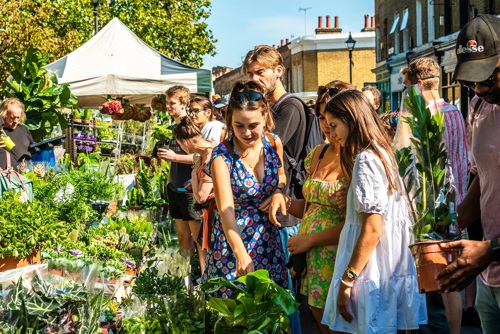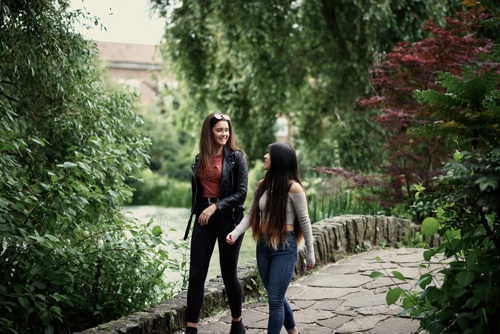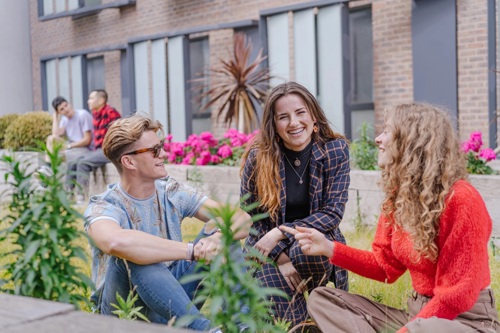
10 ways to make your student living experience more
Eco-friendly
World Earth Day
World Earth Day is an annual event designed to shine a light on environmental problems and what we can do to protect our planet.
The average carbon footprint of every person living in the UK is 12.7 tonnes of carbon dioxide (CO2). That’s equivalent to driving a car around the world, eating 1000 beef steaks or, in weight, the same as 25 million plastic straws.
But in the grand scheme of things, 12.7 tonnes isn’t a lot. Yearly greenhouse gas emissions are around 50 BILLION tonnes. One student living more eco-friendly is a drop in the ocean of a global problem.
So, why should you reduce your carbon footprint? Because, if everyone living in the UK can lower their CO2 emissions by just 100 kilograms (or eight fewer steaks), it would save 6.8 million tonnes of carbon.
By doing your bit can create a ripple effect that makes a real difference.
And the best part? You don’t need to make grand changes.
In support of World Earth Day, let’s take a look at some small, but effective ways to live more eco-friendly during your time at university in London and beyond.
1) RECYCLE AS MUCH AS POSSIBLE
At Chapter, utility bills are included with your overall rates, so you don’t need to worry about cutting back on water or electricity to save money. But using a bit less of both will make a sizable dent in your carbon footprint.
The water sector contributes to around 6% of the UK's total carbon emissions. And while electricity is getting greener thanks to solar and wind power, power stations still account for over 15% of total emissions.
By avoiding energy-intensive aircon systems and using combi oven/microwave/grills in favour of standard ovens, your Chapter room is already doing its bit.
We also follow best energy-saving practices throughout our buildings to help lower our overall footprint. So by choosing us, you’re living more efficiently from the off.
With some simple changes, you can make an even bigger difference:
- Take shorter showers. Showering for one minute less saves around 10 litres of water.
- Turn off lights when you leave the room
- Unplug devices that aren’t in use
- Only boil the water you need
- Wash clothes less and at lower temperatures
The transport sector in the UK emits more greenhouse gases than any other. Globally, the sector accounts for around a quarter of CO2 emissions.
When you have somewhere to go, plan ahead. Look up the distance. Where possible consider travelling on foot or by bicycle. London is very commutable by either method. If time or distance means you need a faster way to travel, use public transport over a car.
Alternatively, consider a lift-sharing app like LiftShare to cut costs, meet new people and lower your carbon footprint at the same time.
There are bins in your Chapter room and in our communal spaces to recycle items. Additionally, you should see bins dotted around university halls. Most universities also have environmental groups that can provide advice and help.
2) BUY LESS
Buy what you need, as opposed to what you want. This isn’t to say you can’t treat yourself every so often. But think about what you’re buying. Ideally, what you spend money on should offer long-term value.
Things like phones or fast fashion items that we tend to replace often have huge carbon footprints — 80% of which is wrapped up in production.
If we all buy less, we’ll help to cut down on this production and the associated waste. It will also slash the CO2 emissions produced in processes related to consumerism such as travel and delivery.
When you go shopping for something new, go for quality. You’re more likely to take good care of items that are a significant purpose.
Buy from sustainable brands that produce items made from recycled materials or use eco-packaging.
Also, consider buying used. Second-hand items are a great way to extend the life of electrical goods and clothes.

3) REUSE WHAT YOU CAN
A ban on single-use, non-recyclable plastics comes into force in the UK from October 2023. This will help reduce carbon emissions nationwide and prevent the impact these plastics have on the environment and wildlife.
But you can ditch disposable items now by switching up what you use:
- Get a reusable water bottle and coffee mug
- Use reusable food containers and travel cutlery
- Swap sanitary towels for a menstrual cup
- Ditch disposable razors in favour of a safety razor
- Use tote bags or reusable carrier bags for shopping
4) SELL OR DONATE WHAT YOU DON'T NEED
Got some old clothes, books or electrical items you no longer need? Consider selling them.
It’s an easy way to make money and lowers your carbon footprint by reducing waste. It also means the buyer isn’t buying new, allowing them to lower their own carbon footprint.
eBay, Facebook Marketplace and Gumtree are all popular places to sell your old goods. For clothes, apps like Depop and Vinted let you give items a new home and boost your bank account in the process. And for books, check out WeBuyBooks or Ziffit.
If you’re happy to pass items on for free, most charity shops welcome good-quality donations. You can also list products on Freecycle and have people collect them.

5) SHARE & BORROW MORE
Before you buy a new book or item of clothing, see if someone you know can help you out.
For example, if you’re heading on a night out, swap outfits with a friend. This way, you both have something different to wear without spending money. And without buying items you don’t really need.
Or, if there’s a particular textbook you need for coursework, ask around. There may be someone in your circle of friends that can lend you a copy.
Alternatively, browse library catalogues. If your university library doesn’t have what you need, one of the 325 public libraries in London probably will.
6) BE MORE SUSTAINABLE
How we use the internet isn’t something we tend to think of when looking for ways to lower carbon emissions. Why would it be? It isn’t a physical thing.
But while they are invisible activities, browsing websites, sending emails and streaming videos or music is energy intensive — estimates put the internet’s carbon footprint at over 3.5% of global greenhouse gas emissions, which is around the same as the aviation industry.
Here's how to reduce your digital carbon footprint and lower the demand for data centre energy production:
- Stream video on a smaller device like a phone or tablet
- Listen to music without video (e.g., switch from YouTube to an app like Spotify)
- Disable autoplay in your browser to make websites with videos less energy-intensive
- Unsubscribe to marketing and spam emails, and any newsletters you no longer read
- Send fewer emails
- If you have a website, use a sustainable web host and limit image and video usage so pages load faster
7) USE LESS PAPER
Around 93% of paper comes from trees — the same trees we need to soak up CO2. According to Trees For Cities, it’s estimated that 2.3 million tonnes of carbon is stored in London’s trees alone.
Using less paper means saving more trees. It also puts a dent in the pulp and paper sector’s carbon emissions, which make up about 2% of the global total.
The good thing is, you can make changes to go paperless without it affecting your day-to-day life:
- Ask your bank and service providers for paperless bills
- If you need a receipt, ask for it to be sent by email (shop receipts printed on shiny paper aren’t recyclable)
- Take notes in class using your phone, tablet or laptop
- Use recyclable wrapping paper (brown paper is a good option)
8) WALK OR CYCLE WHEN YOU CAN
It’s natural to want to take the most convenient method of getting from A to B, especially when you’re in a rush. But convenience isn’t always the best option for the environment or your student budget.
The transport sector in the UK emits more greenhouse gases than any other. Globally, the sector accounts for around a quarter of CO2 emissions.
When you have somewhere to go, plan ahead. Look up the distance. Where possible consider travelling on foot or by bicycle. London is very commutable by either method. If time or distance means you need a faster way to travel, use public transport over a car.
Alternatively, consider a lift-sharing app like LiftShare to cut costs, meet new people and lower your carbon footprint at the same time.

9) SAVE WATER & ELECTRICITY
At Chapter, utility bills are included with your overall rates, so you don’t need to worry about cutting back on water or electricity to save money. But using a bit less of both will make a sizable dent in your carbon footprint.
The water sector contributes to around 6% of the UK's total carbon emissions. And while electricity is getting greener thanks to solar and wind power, power stations still account for over 15% of total emissions.
By avoiding energy-intensive aircon systems and using combi oven/microwave/grills in favour of standard ovens, your Chapter room is already doing its bit.
We also follow best energy-saving practices throughout our buildings to help lower our overall footprint. So by choosing us, you’re living more efficiently from the off.
With some simple changes, you can make an even bigger difference:
- Take shorter showers. Showering for one minute less saves around 10 litres of water.
- Turn off lights when you leave the room
- Unplug devices that aren’t in use
- Only boil the water you need
- Wash clothes less and at lower temperatures
10) EAT LESS MEAT
The food you eat has a big impact on the planet. Food production is responsible for over a third of global greenhouse gas emissions, with the two biggest culprits being meat and dairy.
It’s generally agreed that cutting those foods out of your diet in favour of plant-based alternatives can reduce your carbon footprint by 20%.
If you’d rather not go fully vegan or vegetarian, consider cutting down on meat from sheep and cows — these are the animals that produce the most atmosphere-damaging methane.
Taking up a challenge like Meat Free Monday is a good way to do this. According to a study by Oxford University, if we all swerved a red meat meal once a week, the environmental impact would be equivalent to taking 16 million cars off the road.

REDUCE YOUR CARBON FOOTPRINT
Small changes can make the biggest difference. Implementing some or all of the tips we’ve included in this post will make your student living experience more eco-friendly. And it’s a good feeling to know you’re playing your part.
As you make changes to your living habits, share this post with others. The more people are involved in reducing their carbon footprint, the greater the impact on the environment.
Got any good tips of your own? Let us know @chapterldn.

